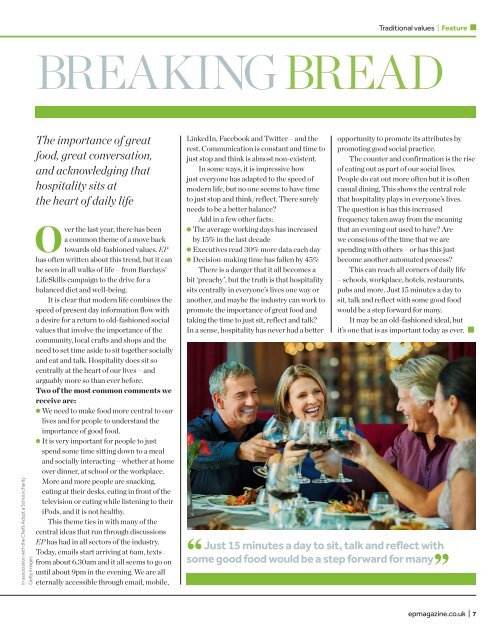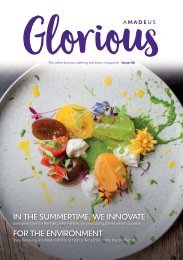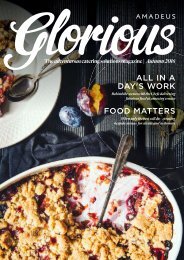EP Business in Hospitality Issue 53 - April 2015
EP magazine provides a reference point for executives on topical issues which may impact business growth, industry structure, professional and skill development, and broader economic and political changes. The magazine reports on all sectors of the industry, including hotels, restaurants, events and foodservice (contract catering).
EP magazine provides a reference point for executives on topical issues which may impact business growth, industry structure, professional and skill development, and broader economic and political changes. The magazine reports on all sectors of the industry, including hotels, restaurants, events and foodservice (contract catering).
Create successful ePaper yourself
Turn your PDF publications into a flip-book with our unique Google optimized e-Paper software.
Traditional values | Feature<br />
BREAKING BREAD<br />
In association with the Chefs Adopt a School charity<br />
Getty Images<br />
The importance of great<br />
food, great conversation,<br />
and acknowledg<strong>in</strong>g that<br />
hospitality sits at<br />
the heart of daily life<br />
Over the last year, there has been<br />
a common theme of a move back<br />
towards old-fashioned values. <strong>EP</strong><br />
has often written about this trend, but it can<br />
be seen <strong>in</strong> all walks of life – from Barclays’<br />
LifeSkills campaign to the drive for a<br />
balanced diet and well-be<strong>in</strong>g.<br />
It is clear that modern life comb<strong>in</strong>es the<br />
speed of present day <strong>in</strong>formation flow with<br />
a desire for a return to old-fashioned social<br />
values that <strong>in</strong>volve the importance of the<br />
community, local crafts and shops and the<br />
need to set time aside to sit together socially<br />
and eat and talk. <strong>Hospitality</strong> does sit so<br />
centrally at the heart of our lives – and<br />
arguably more so than ever before.<br />
Two of the most common comments we<br />
receive are:<br />
We need to make food more central to our<br />
lives and for people to understand the<br />
importance of good food.<br />
It is very important for people to just<br />
spend some time sitt<strong>in</strong>g down to a meal<br />
and socially <strong>in</strong>teract<strong>in</strong>g – whether at home<br />
over d<strong>in</strong>ner, at school or the workplace.<br />
More and more people are snack<strong>in</strong>g,<br />
eat<strong>in</strong>g at their desks, eat<strong>in</strong>g <strong>in</strong> front of the<br />
television or eat<strong>in</strong>g while listen<strong>in</strong>g to their<br />
iPods, and it is not healthy.<br />
This theme ties <strong>in</strong> with many of the<br />
central ideas that run through discussions<br />
<strong>EP</strong> has had <strong>in</strong> all sectors of the <strong>in</strong>dustry.<br />
Today, emails start arriv<strong>in</strong>g at 6am, texts<br />
from about 6.30am and it all seems to go on<br />
until about 9pm <strong>in</strong> the even<strong>in</strong>g. We are all<br />
eternally accessible through email, mobile,<br />
L<strong>in</strong>kedIn, Facebook and Twitter – and the<br />
rest. Communication is constant and time to<br />
just stop and th<strong>in</strong>k is almost non-existent.<br />
In some ways, it is impressive how<br />
just everyone has adapted to the speed of<br />
modern life, but no one seems to have time<br />
to just stop and th<strong>in</strong>k/reflect. There surely<br />
needs to be a better balance?<br />
Add <strong>in</strong> a few other facts:<br />
The average work<strong>in</strong>g days has <strong>in</strong>creased<br />
by 15% <strong>in</strong> the last decade<br />
Executives read 30% more data each day<br />
Decision-mak<strong>in</strong>g time has fallen by 45%<br />
There is a danger that it all becomes a<br />
bit ‘preachy’, but the truth is that hospitality<br />
sits centrally <strong>in</strong> everyone’s lives one way or<br />
another, and maybe the <strong>in</strong>dustry can work to<br />
promote the importance of great food and<br />
tak<strong>in</strong>g the time to just sit, reflect and talk?<br />
In a sense, hospitality has never had a better<br />
opportunity to promote its attributes by<br />
promot<strong>in</strong>g good social practice.<br />
The counter and confirmation is the rise<br />
of eat<strong>in</strong>g out as part of our social lives.<br />
People do eat out more often but it is often<br />
casual d<strong>in</strong><strong>in</strong>g. This shows the central role<br />
that hospitality plays <strong>in</strong> everyone’s lives.<br />
The question is has this <strong>in</strong>creased<br />
frequency taken away from the mean<strong>in</strong>g<br />
that an even<strong>in</strong>g out used to have? Are<br />
we conscious of the time that we are<br />
spend<strong>in</strong>g with others – or has this just<br />
become another automated process?<br />
This can reach all corners of daily life<br />
– schools, workplace, hotels, restaurants,<br />
pubs and more. Just 15 m<strong>in</strong>utes a day to<br />
sit, talk and reflect with some good food<br />
would be a step forward for many.<br />
It may be an old-fashioned ideal, but<br />
it’s one that is as important today as ever.<br />
“<br />
Just 15 m<strong>in</strong>utes a day to sit, talk and reflect with<br />
some good food would be a step forward for many<br />
”<br />
epmagaz<strong>in</strong>e.co.uk | 7

















